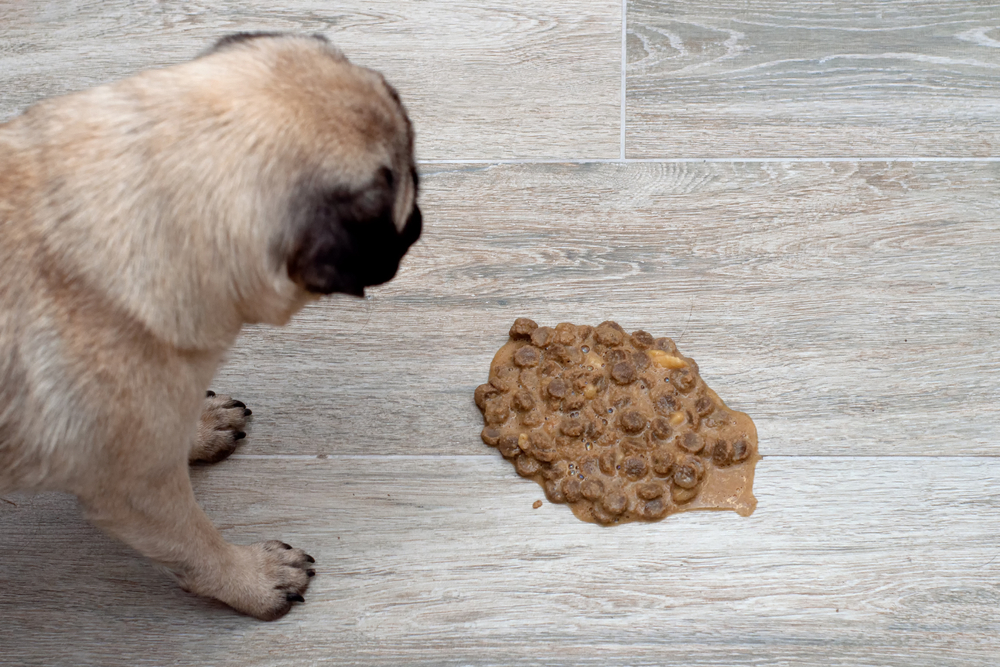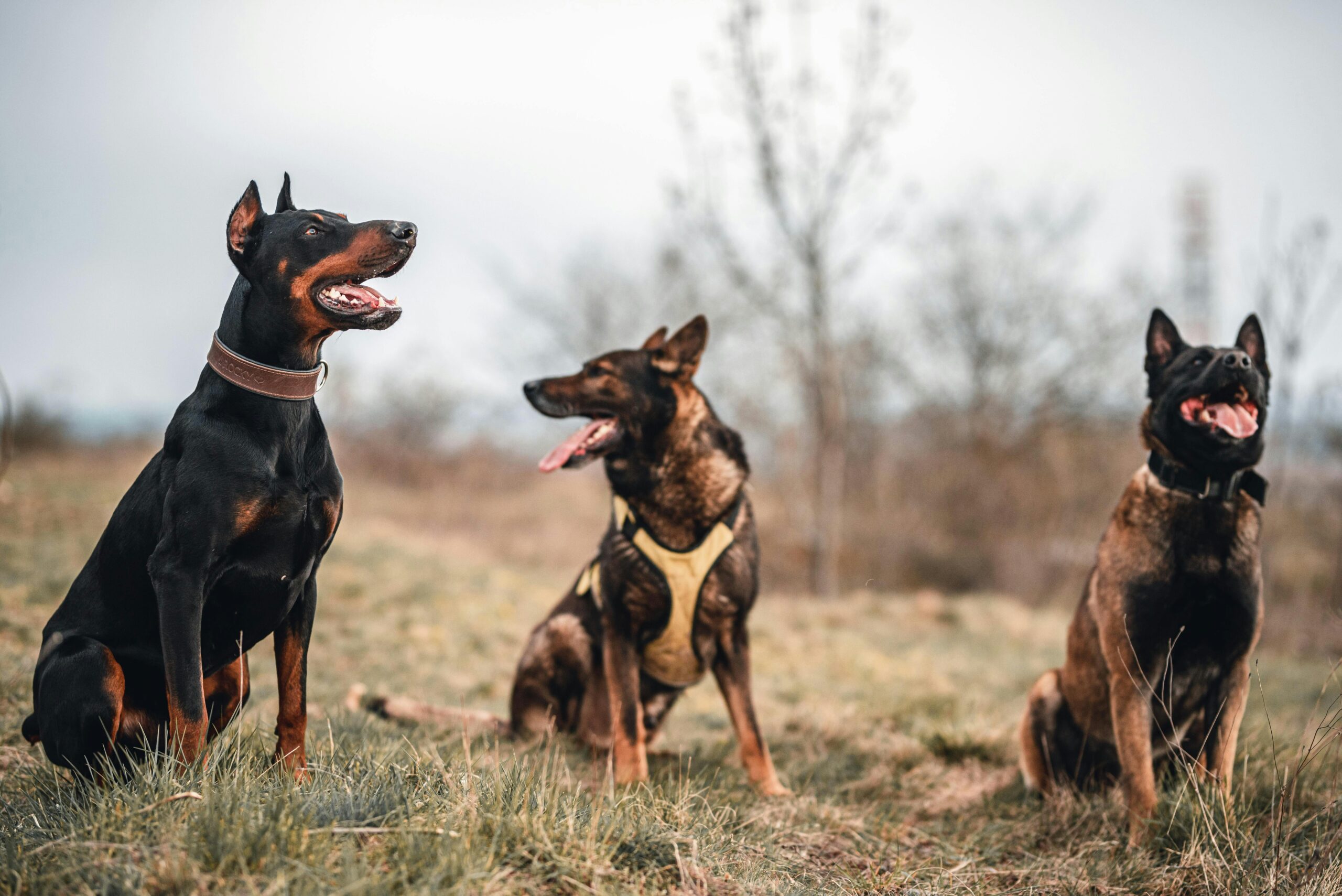Discover why your dog might throw up undigested food after eating and how to address this concern. Get expert insights and helpful tips in this comprehensive guide.

Introduction
As a dog owner, it can be concerning when your furry friend vomits undigested food shortly after a meal. You’re not alone in wondering, “Why does my dog throw up undigested food after eating?” In this detailed guide, we’ll explore the common reasons behind this issue, offer expert advice, and provide solutions to help your dog lead a healthier and happier life.
Understanding Canine Digestion
Before we delve into the reasons behind this phenomenon, it’s essential to understand how a dog’s digestive system works. Dogs have a shorter digestive tract than humans, and their stomachs are highly acidic, designed to break down raw meat and other foods effectively. However, despite these efficient digestive mechanisms, dogs can sometimes experience vomiting of undigested food.
Common Causes of Vomiting Undigested Food
1. Eating Too Quickly
Dogs are notorious for their enthusiastic eating habits. When a dog consumes its meal too quickly, it may not have enough time to properly chew and digest the food, leading to regurgitation.
2. Overeating
Feeding your dog excessively can overwhelm its digestive system, causing it to regurgitate undigested food. Ensure portion control and follow recommended feeding guidelines.
3. Food Allergies or Sensitivities
Some dogs may have allergies or sensitivities to specific ingredients in their food, resulting in vomiting. Investigate the possibility of food allergies and consider switching to hypoallergenic options.
4. Gastrointestinal Issues
Underlying gastrointestinal problems, such as gastritis or inflammatory bowel disease, can lead to vomiting. Consult your veterinarian to rule out these issues.
5. Foreign Object Ingestion
Dogs are known for ingesting items they shouldn’t, such as toys or bones. If your dog swallows a foreign object, it can irritate the stomach lining and cause vomiting.
Preventive Measures
Slow down their eating
To prevent your dog from eating too quickly, consider using slow-feeders or puzzle toys. These gadgets make mealtime more engaging and slow down their consumption, reducing the likelihood of vomiting.
Dietary adjustments
Review your dog’s diet. High-quality dog food can improve digestion. If allergies are suspected, consult your vet for guidance on an appropriate diet.
Visit the vet
If your dog’s vomiting persists or is accompanied by other concerning symptoms, don’t hesitate to visit your veterinarian. They can perform tests to identify underlying issues and provide suitable treatment.
Expert Advice for Managing Vomiting
Dietary Adjustments
To address vomiting due to eating too quickly or overeating, try feeding your dog smaller, more frequent meals. You can also use puzzle feeders to slow down their eating process.
Allergen Identification
If food allergies are suspected, work with your vet to identify the allergen and switch to a hypoallergenic diet.
Veterinary Consultation
For persistent or severe vomiting, consult your veterinarian to rule out underlying health issues. They may recommend diagnostic tests or dietary changes.
Observation
Keep a close eye on your dog to prevent them from ingesting harmful objects. Provide appropriate chew toys to satisfy their need to gnaw.
Regurgitation or Vomiting
Regurgitation explained
Regurgitation is the effortless expulsion of food immediately after eating. It is often due to eating too quickly and rarely a cause for concern. However, if it becomes chronic, consult your vet.
Vomiting explained
Vomiting involves abdominal contractions and is a more serious issue. It can result from various factors, including infections, toxins, or medical conditions. Prolonged or severe vomiting requires immediate veterinary attention.
When to be concerned
If your dog exhibits persistent vomiting, vomits blood, becomes lethargic, or displays other worrying symptoms, consult your veterinarian promptly.
When to Consult a Vet
Persistent vomiting
If your dog vomits repeatedly or for an extended period, it’s a clear sign to consult your vet.
Blood in vomit
The presence of blood in your dog’s vomit is a concerning symptom that necessitates immediate veterinary attention.
Lethargy and other concerning symptoms
If your dog appears lethargic, loses appetite, or displays other unusual symptoms alongside vomiting, a vet visit is crucial.
Dietary Choices
Appropriate portion control
Control your dog’s portions to prevent overeating. Consult your vet for guidance on the correct amount of food for your pet’s age, breed, and activity level.
High-quality dog food
Choose high-quality dog food with ingredients tailored to your dog’s specific needs. Avoid cheap, low-quality brands that may contain fillers.
Special dietary needs
Some dogs have special dietary requirements due to allergies or sensitivities. Consult your vet to determine the most suitable diet for your pet.
The Importance of Hydration
Providing fresh water
Always ensure your dog has access to fresh water, as dehydration can exacerbate digestive issues.
Monitoring water consumption
Pay attention to your dog’s water consumption. An increase or decrease could signal a problem.
Special considerations
Dogs with specific health conditions may require special attention to their water intake. Consult your veterinarian for guidance.
Mealtime Strategies
Elevated food bowls
Using elevated food bowls can help reduce the air intake during meals, preventing regurgitation.
Smaller, more frequent meals
Divide your dog’s daily food portion into smaller, more frequent meals to promote better digestion.
Slow-feeders and puzzle toys
Incorporating slow-feeders and puzzle toys during mealtimes can slow down eating and make it a more enjoyable experience for your dog.
Regurgitation and Breed Predisposition
Breeds at higher risk
Some breeds, such as Bulldogs and Pugs, are more prone to regurgitation due to their physiology. Be mindful of this if you have one of these breeds.
Breeds with fewer occurrences
Conversely, certain breeds experience fewer instances of regurgitation. Research your dog’s breed to understand their specific needs.
Human Food Hazards
Foods to avoid
Many human foods can be toxic to dogs, including chocolate, grapes, and onions. Avoid feeding these items to your furry friend.
Safe human treats
If you want to give your dog human treats, opt for safe options like plain cooked chicken or carrots. Always in moderation.
The importance of moderation
Remember that even safe human treats should be given in moderation. Excess can lead to digestive problems.
Common Allergies
Common food allergies
Dogs can develop allergies to certain ingredients in their food. Common allergens include chicken, beef, wheat, and dairy.
Symptoms of allergies
Allergy symptoms may include itching, skin issues, and digestive problems. Consult your vet for allergy testing if you suspect this is the cause.
Allergy testing
Your veterinarian can perform allergy testing to identify specific allergens and help you adjust your dog’s diet accordingly.
Stress and Anxiety
Identifying stress triggers
Identify the situations or events that cause stress for your dog. Common triggers include loud noises, new environments, or separation anxiety.
Strategies to reduce stress
Implement strategies to reduce stress, such as desensitization training, comforting routines, and natural calming remedies.
When to consult a professional
If your dog’s stress and anxiety are severe and impact their digestion, consult a professional dog behaviorist or trainer.
Home Remedies
Fasting and reintroduction
If your dog occasionally vomits undigested food, fasting them for 12-24 hours and then gradually reintroducing a bland diet can help.
Bland diet
A bland diet of rice and boiled chicken or turkey can soothe your dog’s stomach.
Ginger and probiotics
Ginger and probiotics can aid in digestion and reduce the likelihood of vomiting. Consult your vet before using these remedies.
Why Does My Dog Throw Up Undigested Food After Eating?
Have you ever wondered, “Why does my dog throw up undigested food after eating?” This behavior can be attributed to a variety of causes. It’s essential to observe your dog’s habits, make necessary adjustments, and consult with a veterinarian if needed to ensure their well-being.
FAQs
Can I feed my dog human food to prevent vomiting?
Feeding your dog human food isn’t recommended, as it can lead to digestive issues and potentially worsen the problem. Stick to a balanced dog food diet.
Is vomiting undigested food a sign of a serious health issue?
It can be, especially if the vomiting is persistent. Consult your veterinarian to rule out underlying health problems.
Are there specific dog breeds more prone to vomiting?
While all dogs can experience vomiting, some breeds are more prone to it due to their eating habits or sensitivities. Breeds like Bulldogs and Boxers may be more susceptible.
How can I slow down my dog’s eating?
You can use specialized slow-feed bowls or puzzle feeders designed to make dogs eat more slowly. These can help prevent vomiting due to rapid consumption.
Is vomiting occasionally normal for dogs?
Occasional vomiting may not be a cause for concern, as dogs can have sensitive stomachs. However, frequent or severe vomiting should be addressed with your vet.
What should I do if my dog vomits a foreign object?
If you suspect your dog has ingested a foreign object and is vomiting, consult your veterinarian immediately. Surgery may be necessary to remove the object.
Conclusion
Understanding why your dog vomits undigested food after eating is the first step toward addressing this issue. By making dietary adjustments, identifying allergens, and seeking veterinary guidance when needed, you can help your beloved pet enjoy meals without discomfort. Remember to observe your dog’s habits and prioritize their well-being to ensure a happy and healthy life together.
Thank you for visiting Loving Pet Parents! We’re passionate about providing helpful information and resources to pet owners. If you’ve enjoyed reading our articles, we invite you to explore more of our content on our website. You’ll find a wealth of information on pet care, behavior, nutrition, and much more. Plus, we’re always adding new articles and resources to help you give your furry friend the best possible care. So why not bookmark our website and check back regularly for new content? We appreciate your support and look forward to sharing more valuable insights with you!
Unveiling the Fascinating World of Chow Chow Dogs: A Guide with Unparalleled Insights
Doberman Pinscher Breed: Unveiling the Noble and Powerful Protector
How to Socialize a Dog Through Dog Sports: Unleash the Bonding Power
7 fun brain games for dogs’ mental stimulation
Preventing Sports Injuries in Active Dogs: Expert Tips and Insights
Mastering Fish Stress Relief: Expert Tips for a Healthy Aquarium
Discover the Enchanting Pomeranian: Unraveling the Magic of This Adorable Companion!
Budgie Care Guide: 13 Essential Tips for Happy Birds
25 Tips to Make Traveling with Pets Much Easier
200+ Great Name Ideas for Your Pet Fish with Their Meanings
Cockatoo vs Cockatiel: Unveiling the Key Differences for Bird Enthusiasts
Ultimate Monsoon Pet Care: 8 Essential Tips for a Happy and Healthy Furry Companion
Discover 200+ Cute Cat Names for Every Kind of Kitty: A Purrfect Guide to Naming Your Feline Friend
The Ultimate Guide to Arowana Care: Expert Tips and Advice
All About the Legendary Bengal Cat
Top 10 Low-Maintenance Tropical Fish That Are Easy to Care For
Complete Betta Fish Care Guide For Beginners: Everything You Need
Betta Fish Fin Rot: Symptoms, Causes, Prevention & Treatment
We hope you’ve found our articles informative and helpful in caring for your furry companion. If you think our content could benefit other pet owners, we would greatly appreciate it if you shared it with your friends and family. By sharing our articles, you’ll be helping to spread valuable information that can improve the lives of pets and their owners. You can share our articles on social media, through email, or by simply telling others about our website. We thank you for your support and for helping us reach even more pet lovers with our content.





